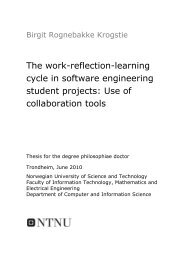Disputation Mikhail Fominykh - Department of Computer and ...
Disputation Mikhail Fominykh - Department of Computer and ...
Disputation Mikhail Fominykh - Department of Computer and ...
You also want an ePaper? Increase the reach of your titles
YUMPU automatically turns print PDFs into web optimized ePapers that Google loves.
Evaluation<br />
TP3:<br />
Learning communities in 3D CVEs can be supported by means <strong>of</strong><br />
collaborative work on 3D content in a specially designed environment.<br />
The VRA framework partly proves the theoretical proposition by the results <strong>of</strong> the<br />
second empirical study on educational visualizations in which it was applied <strong>and</strong><br />
where learning communities were supported by means <strong>of</strong> collaborative work on<br />
3D content.<br />
This contribution is most thoroughly presented in Paper 6 <strong>of</strong> this thesis.<br />
5.1.6 ‘Universcity’ framework<br />
The corresponding research question was formulated as follows:<br />
RQ3b: How to support learning communities in an educational virtual city?<br />
The question was answered by developing the ‘Universcity’ framework. This<br />
framework is a result <strong>of</strong> a theoretical study conducted within this PhD work<br />
though it was inspired by the empirical studies <strong>and</strong> R&D projects. ‘Universcity’<br />
incorporates earlier developed frameworks <strong>of</strong> virtual campus, virtual city, CVW,<br />
<strong>and</strong> VRA.<br />
The ‘Universcity’ framework can be considered as a contribution to Topic 3 <strong>of</strong> this<br />
thesis – Support for learning communities in 3D CVEs as it helps to fill the gap in<br />
the design <strong>of</strong> 3D CVEs for support <strong>of</strong> learning communities. In addition, it provides<br />
an original holistic approach to a virtual city design. The framework meets one <strong>of</strong><br />
the challenges formulated based on the background that there is a need for<br />
exploring how 3D CVEs can support learning communities.<br />
The corresponding theoretical proposition was formulated as follows:<br />
TP3:<br />
Learning communities in 3D CVEs can be supported by means <strong>of</strong><br />
collaborative work on 3D content in a specially designed environment.<br />
The ‘Universcity’ framework partly proves the theoretical proposition by<br />
suggesting a design <strong>of</strong> an educational virtual city that supports learning<br />
communities.<br />
This contribution is most thoroughly presented in Paper 5 <strong>of</strong> this thesis.<br />
5.2 Validity discussion<br />
The research approach taken in this research work has a number <strong>of</strong> limitations.<br />
Validity threats to the four case studies conducted within this research work are<br />
discussed together in this section, as they had similar design.<br />
5.2.1 Construct Validity<br />
This type <strong>of</strong> validity deals with establishing correct operational measures for the<br />
concepts being studied.<br />
57
















